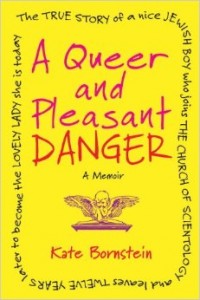 A Queer and Pleasant Danger: The true story
A Queer and Pleasant Danger: The true story
of a nice Jewish boy who joins the Church of
Scientology and leaves twelve years later to
become the lovely lady she is today
by Kate Bornstein
Beacon Press. 280 pages, $24.95
AT four-and-a-half years old, most kids are just learning their ABCs, but Albert Bornstein knew at that age that he wasn’t a boy, so he must be a girl. He also knew that this wasn’t what people wanted to hear, so he never spilled his secret. Instead, he grew up wanting to be Audrey Hepburn—and if not Hepburn, there were other choices. He always loved women, and there were so many that he could imagine being!
It was mid-1970 when Bornstein—twenty-something, anor-exic, altruistic, and seeking spiritual meaning—started a cross-country pilgrimage that landed him in Colorado. There, while looking for new boots, he found a Scientology center. He entered, and he stayed. Happy in his newly embraced “applied religious philosophy,” Bornstein became the perfect Scientologist. Charming and silver-tongued, he quickly developed into a top-performing salesman of high rank. Two years after joining the organization, he was married; a year after that, he was a father.
He also began acting upon his girlish urges, but wasn’t bothered by it. Scientology taught that humans were spiritual beings called thetans, and thetans had no gender; so what harm was there in wearing women’s clothing and sleeping with men? His inner woman seemed unstoppable.
Then, twelve years after joining, everything came crashing down. Due to a still-dizzying misunderstanding, Bornstein was cast out of the community he’d embraced for a third of his life and forever denied a chance to see his child. Feeling bereft—and overwhelmed by his increasingly feminine notions—he sought therapy and a community of a different kind, and ended up finding the person that she was all along.
There are a number of adjectives that one could use to describe A Queer and Pleasant Danger: snarky, funny, anguished, frightening, heartbreaking, brave, honest. The author worked for six years on this memoir, which she started writing for her daughter (whom she assumes will never read it) and wrote for the teenage grandchildren who may be going through turmoil similar to what she experienced. Feeling no need to hold back, she sometimes speaks directly to her estranged family members, perhaps hoping that they’ll read her life story and come to know her in this indirect way.
As for her years in Scientology, what Bornstein doesn’t say is perhaps more chilling than what she does say. The things she’s unable or unwilling to discuss, others that she’s only marginally allowed to hint at—and even that could put her in danger—give the reader a sense of why she literally winces when talking about what happened there. This facet of her book, which is woven into the entire narrative of her adult life, betrays the lasting influence that Scientology has had upon her development.
Still, Bornstein often seems to cavalierly brush aside painful parts of her story with a charming flippancy that barely conceals the lasting sting. It is that humor mixed with mordancy that her fans have come to know and love. But readers will be able to see between the lines. In writing this memoir, Bornstein openly displays a certain bravado that doesn’t outlast the vulnerabilities it is meant to conceal. This is a softer, sometimes regretful, often sorrowful side of the always outspoken Kate Bornstein.
Sensitive readers will want to be aware that there are flinch-worthy, graphic, and brutally blunt scenes in this book, though all are appropriate to this memoir, and Bornstein is careful to give warning. If you can handle that (or you can possibly stand to skip over an integral part of this memoir), this is a book that’s dangerously appealing.





